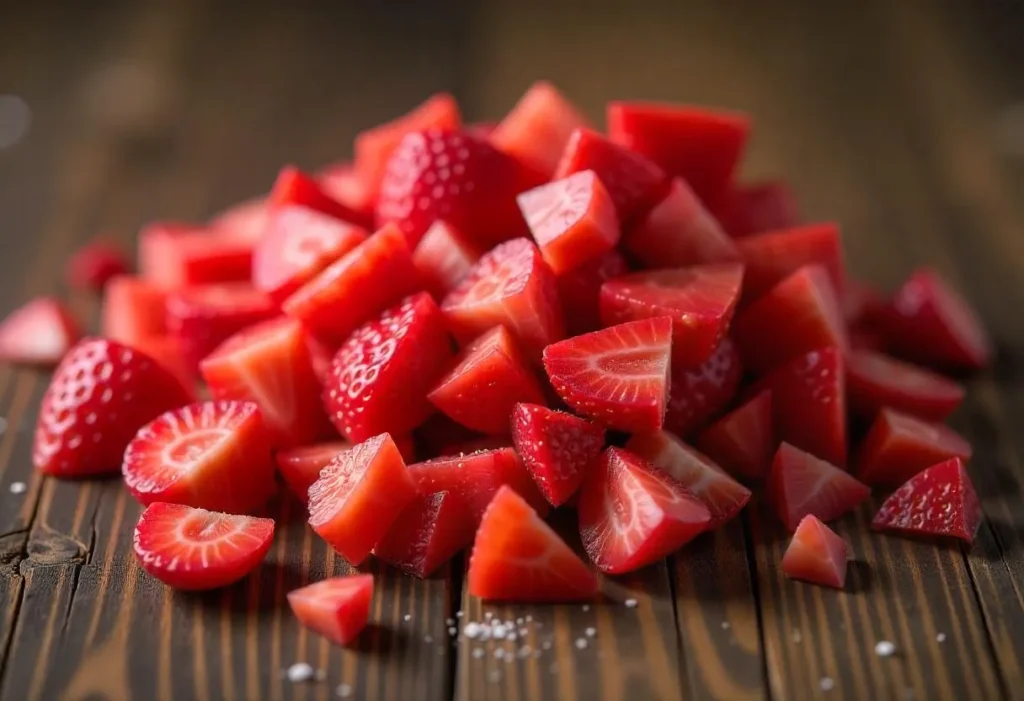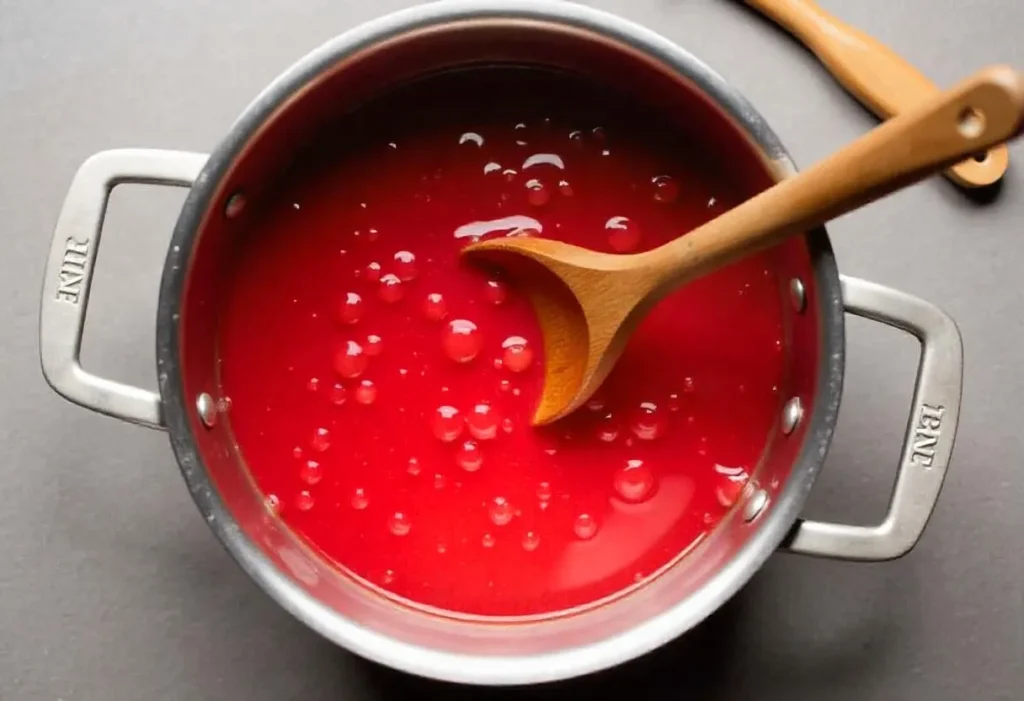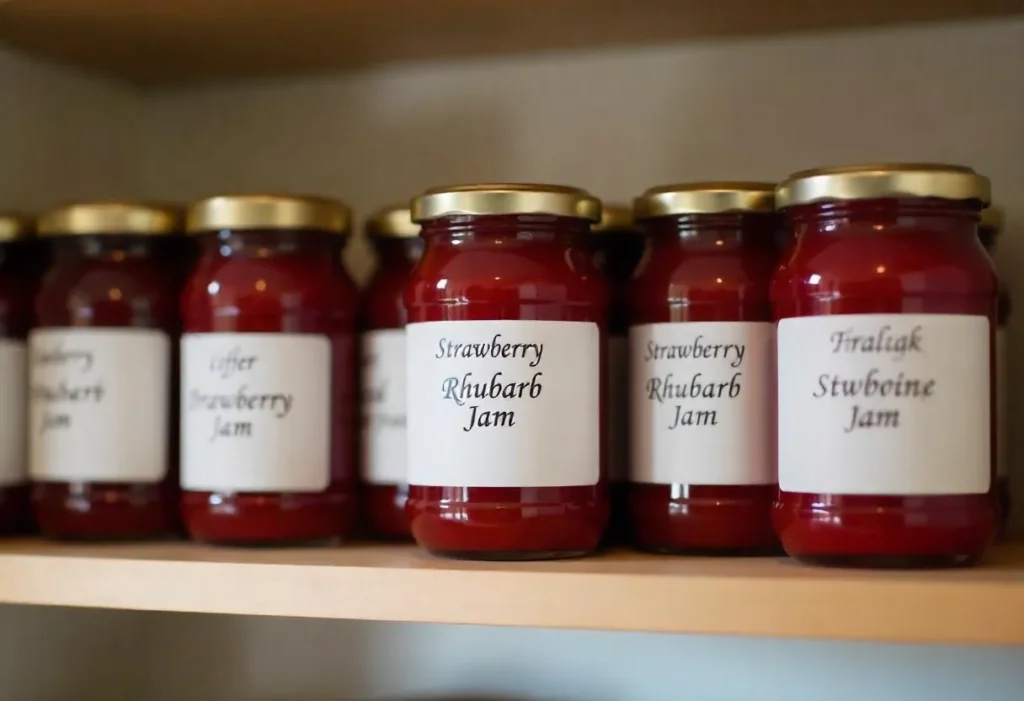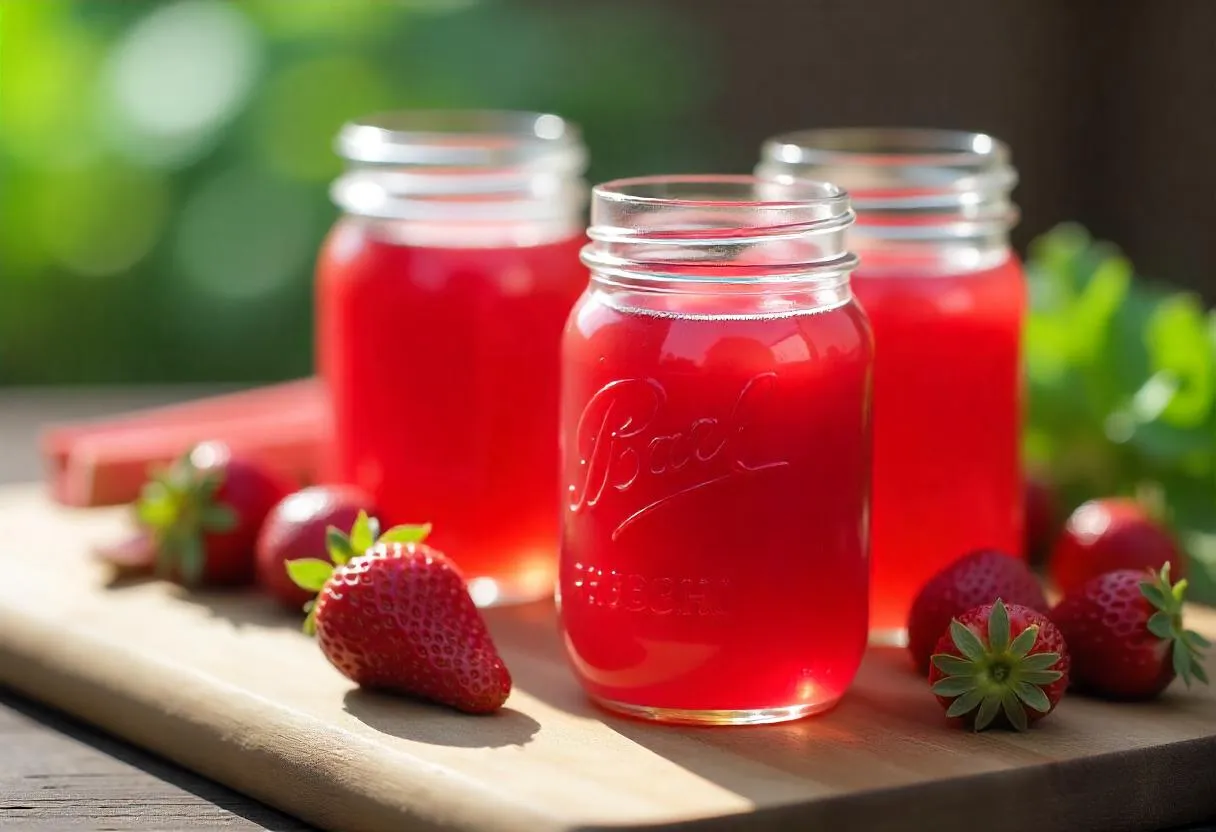Table of Contents
Introduction: Embracing Summer’s Bounty
Ah, summer—the season of sun-kissed days, blooming gardens, and the irresistible aroma of fresh fruits wafting through the air. Among the treasures of this season, rhubarb and strawberries stand out, offering a harmonious blend of tartness and sweetness that’s perfect for crafting a delightful jam.
The Perfect Pair: Rhubarb and Strawberries
Flavor Profiles: Tart Meets Sweet
Rhubarb, with its vibrant red stalks and tangy flavor, pairs exquisitely with the natural sweetness of strawberries. This combination creates a balanced taste that’s both refreshing and indulgent, making it a favorite for jams and preserves..Natural Mounjaro Recipe
Nutritional Benefits of Rhubarb and Strawberries
Beyond their delightful taste, both rhubarb and strawberries are packed with nutrients. Rhubarb is a good source of vitamin K and fiber, while strawberries are rich in vitamin C and antioxidants. Together, they not only tantalize the taste buds but also contribute to a healthy diet.
Selecting and Preparing Your Ingredients
Choosing the Best Rhubarb and Strawberries
For the best jam, select fresh, firm rhubarb stalks with a deep red hue and avoid any that are limp or blemished. When it comes to strawberries, opt for bright red berries that are firm to the touch and free from mold or bruises.
Prepping Tips for Optimal Flavor
Before cooking, wash the rhubarb thoroughly and trim off the leaves, as they are toxic. Cut the stalks into even pieces to ensure uniform cooking. For strawberries, remove the stems and hulls, then slice them to match the size of the rhubarb pieces.
Crafting the Perfect Jam
Traditional Jam-Making Methods
The classic approach involves combining equal parts of rhubarb and strawberries with sugar and lemon juice, then cooking the mixture until it reaches the desired consistency. This method often uses pectin to help the jam set properly..Creme Brulee Guide
Pectin-Free Alternatives
For those looking to avoid added pectin, natural pectin found in the fruits can suffice. Cooking the mixture longer allows the natural pectin to activate, resulting in a slightly softer set but equally delicious jam.Reddit
Slow Cooker Jam: A Modern Twist
Using a slow cooker offers a hands-off approach to jam-making. Simply combine your ingredients in the cooker, set it on low, and let it simmer until the jam thickens. This method preserves the fresh flavors and minimizes the risk of burning.

Common Challenges and Solutions
Preventing Discoloration in Rhubarb Jam
Over time, rhubarb jam may lose its vibrant color and turn brown. To maintain its hue, add a splash of lemon juice during cooking, which helps preserve the color and enhances the flavor.
Addressing Fruit Float Issues
Fruit pieces rising to the top of the jar, known as fruit float, can be mitigated by stirring the jam gently but thoroughly before ladling it into jars. Ensuring a uniform mixture helps distribute the fruit evenly.
Common Problems and Their Solutions
Even the best cooks run into a few bumps on the jam highway. Here’s how to turn those sticky situations around.
My Jam Didn’t Set! Now What?
This is the #1 jam-making woe. Your jam looks like soup even after cooling? Don’t worry—it’s fixable!
Fix:
- Reboil it with 1 tbsp of lemon juice and/or pectin.
- Simmer for 5–10 more minutes, then redo the plate test.
“Jam not setting? You just haven’t reached your ‘gel moment’ yet.” — Aunt Patty, kitchen wizard
The Jam is Too Runny or Too Thick
Consistency is key when spreading love on toast.
Too Runny?
- Didn’t boil long enough.
- Not enough pectin or acidity.
Too Thick?
- Overcooked it.
- Too much pectin added.
Solution: Adjust your boil time and sugar/acid ratio. Don’t skip the plate test—it’s your jam’s report card.
Taste Troubles: Too Tart or Too Sweet
Some like it sour, some like it sugary. Here’s how to balance the taste:
- Too Tart? Add a splash of apple juice or honey while reheating.
- Too Sweet? Add a bit more lemon juice or a pinch of salt to cut the sugar.
🧪 Flavor Fact: Rhubarb’s acidity intensifies when overcooked—go easy on the simmer!
Storage Tips & Shelf Life
Once you’ve bottled your jam, you want it to stay fabulous, right?
Best Ways to Store Your Jam
- Unopened Jars: Store in a cool, dark pantry (lasts up to 1 year).
- Opened Jars: Refrigerate and consume within 2–3 weeks.
- Frozen Jam: Yes, you can freeze it! Just use freezer-safe jars and leave space for expansion.
How Long Does It Last?
| Storage Type | Shelf Life |
|---|---|
| Pantry (sealed) | 12 months |
| Fridge (opened) | 2–3 weeks |
| Freezer | Up to 1 year |
“Jam is like summer’s time capsule. Store it right, and every scoop brings the sunshine back.” 🌞🍓

Creative Uses for Rhubarb-Strawberry Jam
Sure, jam on toast is classic—but let’s get creative! Here are some deliciously unexpected ways to enjoy your fruity masterpiece..Vegan Chocolate Hazelnut Granola
Beyond the Toast: Top 5 Delicious Uses
- Swirled into Yogurt or Oatmeal 🥣
- Jam-Filled Thumbprint Cookies 🍪
- Layered in Cheesecake or Parfaits 🍰
- Glazed on Chicken or Pork 🍖
- Mixed into Salad Dressings or BBQ Sauces 🥗🔥
Sweet Meets Savory: Unusual Pairings That Work
Rhubarb-strawberry jam isn’t just for breakfast.
- Grilled Cheese & Jam Sandwiches: A match made in culinary heaven.
- Charcuterie Board Star: Pair it with goat cheese or brie.
- Topping for Burgers: Yes, seriously—just try it!
Nutrition Facts Table
Let’s see how our jam stacks up nutritionally. This is per 1 tablespoon (approx. 20g):
| Nutrient | Amount |
|---|---|
| Calories | 40–50 |
| Sugar | 9–11g |
| Total Fat | 0g |
| Saturated Fat | 0g |
| Sodium | 0mg |
| Fiber | 0.3g |
| Vitamin C | 8% DV |
✅ Low-fat
✅ High-fruit
✅ No preservatives
Recipe Table: Ingredients and Quantities
Here’s a handy table you can keep on your fridge or kitchen wall 🧾👇
| Ingredient | Quantity | Notes |
|---|---|---|
| Fresh Strawberries | 4 cups (sliced) | Choose ripe, red berries |
| Rhubarb Stalks | 3 cups (chopped) | Firm, red stalks preferred |
| Sugar | 2.5 – 3 cups | Adjust to taste |
| Lemon Juice | 2 tbsp | Freshly squeezed |
| Pectin (optional) | 1 pouch | For quicker setting |

FAQs
Let’s answer the burning questions home cooks ask the most.
Can I Freeze Rhubarb-Strawberry Jam?
Absolutely! Use freezer-safe jars, leave a little headspace, and freeze away. Thaw in the fridge before using.
Do I Need to Use Pectin?
Nope! Rhubarb and strawberries have some natural pectin. But if you’re in a hurry or want a firmer set, a packet of pectin helps.
How Do I Make It Less Sweet?
Cut the sugar and replace with apple juice, honey, or a bit of stevia. Add more lemon juice to balance the taste.
Can I Use Frozen Fruit Instead of Fresh?
Yes! Just thaw it completely and drain excess liquid to avoid a watery jam.
What’s the Best Sugar Alternative for Jam?
- Honey
- Maple Syrup
- Coconut Sugar
- Stevia (for low-carb)
Note: Substitutes may affect the jam’s texture and set.
How Can I Tell if My Jam Has Spoiled?
Watch for:
- Mold
- Fizzing or bubbling
- Off smell
- Color changes
When in doubt, toss it out! 🚫🫙
Conclusion: Jam-Making as a Summer Tradition
There’s something magical about making your own jam. It’s part kitchen science, part cozy tradition, and all heart. 💖 You get to control the ingredients, reduce waste, and share a spoonful of sunshine with your family and friends.
Whether you slather it on toast, drizzle it over cheesecake, or sneak spoonfuls straight from the jar (we won’t tell!), Summer Rhubarb-Strawberry Jam is more than a recipe—it’s a memory in the making. 🫙🌞
“Every jar is a hug from summer. Seal it, share it, and savor it.”

Name: Summer Rhubarb-Strawberry Jam
Ingredients
Equipment
Method
- Instructions:
- Wash and prep your strawberries and rhubarb.
- In a large pot, combine fruit, sugar, and lemon juice. Let sit for 30–60 minutes to draw out juices.
- Bring to a boil over medium-high heat, stirring constantly.
- Optional: Add pectin and boil according to package directions.
- Reduce heat and simmer until jam thickens (about 20–30 minutes).
- Test doneness with the plate wrinkle test.
- Sterilize jars and lids in boiling water.
- Ladle hot jam into jars, leaving ¼-inch headspace.
- Wipe rims, seal with lids, and process in a boiling water bath for 10 minutes.
- Let cool at room temperature. Label and store.
